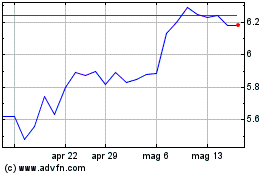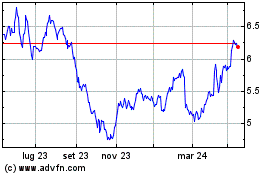Air New Zealand Considers Sale of Virgin Australia Stake
30 Marzo 2016 - 8:20AM
Dow Jones News
Air New Zealand said it may sell part or all of its near-26%
stake in Virgin Australia Holdings Ltd. just as Australia's
second-largest carrier by revenue searches for funding options to
shore up its balance sheet.
Virgin Australia shares fell more than 9% Wednesday after Air
New Zealand—Virgin Australia's biggest shareholder—said First NZ
Capital and Credit Suisse would advise it on its options for the
stake, which is valued at around 348 million Australian dollars
(US$266 million).
Tony Carter, Air New Zealand's chairman, said that the company
didn't want a large minority equity stake in Virgin Australia as it
focuses on its own expansion opportunities.
Grant Williamson, investment adviser at Christchurch brokerage
Hamilton Hindin Greene, said Air New Zealand's reluctance to be a
minority shareholder made sense. "They should probably focus on
their own business without getting tied down with shareholdings in
other companies, which take up management's time and
resources."
Last week, Virgin Australia secured a A$425 million loan
facility from Air New Zealand and three other major shareholders,
Etihad Airways, Singapore Airlines Ltd. and Virgin Group, to give
it liquidity while it reviews its capital structure. Air New
Zealand said it intends to coordinate its plans with Virgin
Australia's broader review of its capital structure.
In recent years, supported by its big shareholders, Virgin
Australia has invested heavily in transforming its business from a
budget carrier to a full-service airline, competing head-to-head
with larger rival Qantas Airways Ltd. The two airlines engaged in a
damaging price war that caused mounting losses for both companies
before pressure from investors spurred them to scale back on
capacity.
Qantas's finances have since rebounded, swinging from a A$2.84
billion loss to a A$557 million profit in the year ended June 30,
2015, before its profit more than tripled in the first half of the
current fiscal year, helped by a tough cost-cutting program that
has made it a leaner operation. That has allowed it to return cash
to long-suffering shareholders and start buying more planes and
increasing capacity on popular routes. The carrier's
investment-grade credit rating also has been reinstated by Standard
& Poor's and Moody's Investors Service.
Virgin Australia's recovery has been slower and less
spectacular. In February, the airline reported a net profit of
A$62.5 million for the six months through December, up from a loss
of A$47.8 million for the year-earlier period. Despite falling fuel
prices that are proving a boon for airlines around the world,
Virgin's heavy investment in recent years has left it more highly
geared than Qantas, making it harder to compete. During its
first-half results, Virgin Australia announced plans to sell
several aircraft to help pay down debt, but analysts remain
concerned about its weak balance sheet.
"It has been obvious the company is in need of some funding, and
today's announcement just reinforces that view," said Bell Potter
analyst John O'Shea.
Virgin Australia in a brief statement Wednesday said that it
would continue its capital-structure review.
If Air New Zealand sells its stake in Virgin Australia, it will
be exiting an investment that has underperformed its own business.
The New Zealand carrier reported a net profit of 338 million New
Zealand dollars (US$231 million) for the six months through
December, up from NZ$133 million in the year-earlier period.
Air New Zealand Chief Executive Christopher Luxon has resigned
from the board of Virgin Australia as part of the company's review
of its shareholding.
Write to Kate Geenty at kate.geenty@wsj.com and Rebecca Thurlow
at rebecca.thurlow@wsj.com
(END) Dow Jones Newswires
March 30, 2016 02:05 ET (06:05 GMT)
Copyright (c) 2016 Dow Jones & Company, Inc.
Grafico Azioni Qantas Airways (ASX:QAN)
Storico
Da Dic 2024 a Gen 2025

Grafico Azioni Qantas Airways (ASX:QAN)
Storico
Da Gen 2024 a Gen 2025
